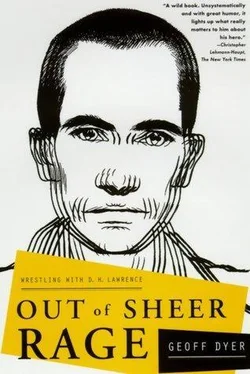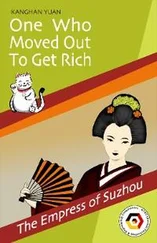And it was not surprising, I reflected when we were out in the street again, for I had not asked Salvatore’s mother anything. Even though she had known Lawrence I had said nothing to her except ‘ Buongiorno ,’ which should have been ‘ Buonasera ’. How nice it would have been, how authoritative, if she had said, ‘Mr Lawrence he was very nice, molto simpatico ,’ something like that. Spoken by a woman who had actually known him this otherwise unexceptional observation would have carried more weight than anything I had ever read about Lawrence in dozens of memoirs. This was as near to Lawrence as I was ever likely to get and I hadn’t asked her anything, partly because she was old and tired and I was too respectful, but mainly because it had simply not occurred to me to ask her anything and now it was too late.
*
That night, as a gesture of appreciation, we invited Ciccio to dinner at the restaurant of his choice. A seafood restaurant, as it turned out. Not a great choice from my point of view since seafood is vile filth which I will eat under no circumstances. My favourite foods are all variants of bread, food you can chow down with no effort, without even a knife and fork, food that requires virtually no preparation and little expenditure of money or energy. At the other extreme there is food that you have to fiddle around with, food that comes in shells that you have to prise open, food that you have to prepare for hours and pick the bones out of and pay for through the nose: seafood in short, and here we were in a seafood restaurant. The first course arrived: not any old seafood (i.e. not simply inedible) but the ultimate seafood (i.e. there was actually nothing to eat): sea urchins, blackened conker shells with a tiny strip of (presumably) slimy, salty, orange gristle in the middle. A great delicacy, no doubt, in the tacit sense that delicacy is always employed: revolting filth that requires the greatest care in preparation otherwise you’ll spend the next week crapping squid ink. Needless to say, as with all this revolting, salty-tasting crap, it is, allegedly, a great aphrodisiac.
‘What’s it like?’ I asked out of politeness, crunching a grissino stick.
‘You know when you were little and you jumped in the sea, and water went up your nose?’ said Laura. ‘It tastes like that. Only it doesn’t burn.’
Ciccio and Laura crunched through a couple of plates of these blackened conker shells. As always happens with seafood the detritus was way in excess of what little bits there were to eat and soon the table was piled high with urchin shells. What next? I wondered. Ah mussels, of course. I hate anything that comes in shells and this meal was going to be nothing but shell — shell and, if I was lucky, bones. By now I was desperately hungry and since although I will not eat seafood I can eat fish — at a push — I helped myself to a portion of the fish that Ciccio had ordered for us all. I hadn’t asked what kind of fish it was but I recognised it as soon as I had had my first mouthful: a bone fish, a fish so full of little white bones that you had to pick and inspect, sift and sort through every forkful to make sure you didn’t choke — and after a while that demanded more concentration than it was worth so I just left it on my plate.
At that point, a low point for me, a friend of Ciccio’s arrived bearing the bag of stuff we were to take back to Renata. He shook hands, handed over the bag and left. In the bag were cartons of Prozac: boxes and boxes of Prozac. The delivery of this consignment was clearly a relief to Ciccio and he was now able to get down to the serious business of the evening: phoning Renata. The waiter brought a cordless phone, Ciccio dialled and was immediately submerged in conversation. I had realised some time ago that Ciccio’s phone bills were fairly heavy but now I saw that his acquaintances also bore part of the punishing cost of his relationship with Renata. After a surprisingly short time, however, he hung up.
‘She’s calling back,’ he explained, unstrapping his watch and putting it on the table in front of him as if to say: right, now we’re going to have a real phone call. After thirty seconds, though, she had still not called back and so he tried her again. Engaged. He lit a cigarette and tried again. Engaged. They had reached telephonic gridlock; both lines were engaged constantly because they were both trying to call each other. Drawing deeply on his cigarette, Ciccio mustered all his will-power and let the phone sit there unused. It rang and Ciccio snatched it up. It was Renata and she was close to hysteria. Why hadn’t he called? The whole scene was like a government health warning for the adverse side-effects of Prozac. On the other hand what would she have been like without Prozac? Dead possibly, whereupon Telecom Italia would either suffer a major reduction in turnover or, alternatively, would have been free to liberate a good part of its network for more urgent matters than this mad romance.
At the end of the evening I settled the bill, still hoping, even as I handed over my wad of lire, that Ciccio would either offer to pay or tell the owner that I was writing an article on his restaurant. We left the restaurant and Ciccio drove us back to vile Furci. We drove as if our lives depended on it, as if our lives didn’t depend on it. We overtook everything in sight but, since other people were overtaking us , then — by the Italian law of highway moderation — we were driving perfectly safely.
I was looking forward to sitting on the train for eight or nine hours, reading Sea and Sardinia , thinking about Lawrence and Sicily, not budging from my seat. Instead, once we got to Villa San Giovanni, it was the train that refused to budge. More precisely, it budged a bit, shunting back and forth a few metres each way to hook up extra carriages from the ferry. The train extended itself by two carriages at a time until it was half a mile long. While all this was going on I hung out of the door, brake-man-style, looking out across the rails and the empty freights towards the blue Straits of Messina and, beyond that, Sicily. When the train was ready the doors shut and. . we stayed where we were for another half an hour. Then the air-conditioning came on and. . we stayed where we were for a while longer.
This proved to be only the first instalment in a series of setbacks. Later, as we headed out of Napoli, there was a crash and my window shattered. An explosion of glass. We threw ourselves to the far side of the compartment which was full of screaming. Something had hit the window, shattering it, but, we saw now, the window was intact even though it had shattered. The double laminate had saved us: the outside pane had smashed but the inner one had held. A guard came running and the train pulled in at the next station, Aversa. A rock, he said, or a brick. It happens all the time. Boys gather on the bridges and hurl rocks and bricks at trains: a popular hobby in Napoli. Last year five people were killed.
‘ Non è una buona idea ,’ said the fat man sitting next to me, ‘ sedersi vicino al finestrino a Napoli .’
A team of railway officials began digging out the remains of the window. We got off the train, milled around and got back on again. I took the same seat as before, aware now that there was only a single pane between me and the rock-strewn world outside. Everything proceeded smoothly until the intercom pinged into life and the guard asked if there was a doctor on the train. If there was a doctor on board could he go immediately to the back of the train because there was a medical emergency. We heard no more about it but at the next station the train made another unscheduled stop. At the far end of the platform, a stretcher was waiting.
Читать дальше












